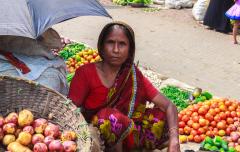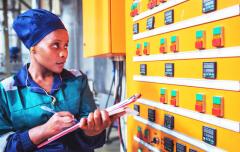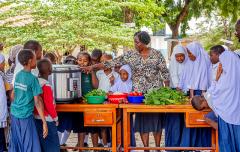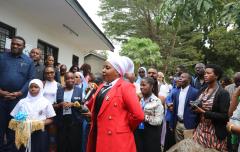“Women can play a crucial role in upscaling energy access in remote, hard-to-reach areas.” Partner spotlight interview with ENERGIA’s Sheila Oparaocha
In an interview with Sheila Oparaocha, international coordinator and programme manager at ENERGIA, we discuss the organization’s two decades of work on gender and sustainable energy in Africa and Asia.
Tell us about ENERGIA. What does your work focus on?
We at ENERGIA envision equal and equitable access to and control over energy services for women and men. Reality shows that we’re still far from that goal. Hence, everything we do at ENERGIA points in that direction. All our actions, activities and programmes are in line with Sustainable Development Goals 5 and 7 – gender equality and energy access – and we approach the topics from different disciplines. Together with more than 35 partners we run programmes and projects in nearly 20 countries. These programmes include research, women’s empowerment, advocacy and gender mainstreaming.
Our research programme looks into the gendered impact of energy access in seven areas, including for example the informal food sector, mainly run by women, and the impact of fuel subsidies on women. In our women’s empowerment programme, we support women to become successful energy entrepreneurs. Impacts and lessons from these programmes influence our advocacy and policy work at the global, national and regional levels. We provide the faces and voices, as well as the facts and figures, to back our lobbying for gender inclusion in energy policies, programmes and projects.
How does ENERGIA support increasing energy access?
Women can play a crucial role in upscaling energy access in remote, hard-to-reach areas in developing countries, so we are working with women entrepreneurs in these areas. These women are managers and users of household energy, they have vast networks of other potential users, and as users themselves, they are compelling messengers of the benefits. In our women’s economic empowerment programme, we appeal to this unique position women have, and support them to become successful energy entrepreneurs, providing mainly solar lamps and solar home systems, as well as improved cookstoves. With five amazing partners on the ground — CRT/N in Nepal, Energy 4 Impact in Senegal, Kopernik in Indonesia, Practical Action in Kenya and Solar Sister in Tanzania and Nigeria — we provide women entrepreneurs with trainings to develop or improve their business skills, but we also give them hand holding technical support. We link them to markets, financial institutions, local governments and the private sector. We also provide them with leadership and agency trainings. From 2014 to 2017, we worked with more than 4,000 women entrepreneurs who together have provided sustainable energy solutions to 2.6 million people.
The ENERGIA Gender and Energy Research Programme also contributes to increased energy access, but more on a policy level. It develops evidence for informed policy decision-making. In 2018, the final year of the research programme, the findings from the seven research teams on different themes on gender and energy will be presented and discussed at many forums for policy makers, business and NGOs working in the energy sector for enhanced gender equality in energy access.
You’re a partner of the People-Centered Accelerator. Why is a platform focused on gender equality, social inclusion and women’s empowerment necessary in the energy sector?
When ENERGIA was founded in 1996, we were the only player in the field. Now, there are many other organisations looking into the gender and energy nexus, some with specific women’s empowerment programmes, all working with women to increase energy access. Exchanging and learning from each other and working together will truly give ‘us’ -- organisations and programmes linking gender and energy – a legitimate role and voice in scaling energy access. Together we will be able to convene and reach larger audiences, from governments to the private sector. When it comes to scaling energy access, large investment programmes are still seen as the way to go, but we need decentralised inclusive solutions to make sure no one is left behind.
One of ENERGIA’s key contributions to the People-Centered Accelerator has been supporting the development of an interactive mapping website, going ‘live’ later this spring, that will enable policymakers, donors, practitioners and researchers to understand existing initiatives in the energy and gender space. Why is this important?
At ENERGIA, we know a lot of players in the field, but we also know that there are many others that are not on our radar. Each and every player in the field brings added value and expertise others can learn from, build upon and complement. We realized how useful disclosure of this information would be for everyone. The Ministry of Energy in a specific country would get an overview of which organisations are active in that country. An investor would know which social enterprise to turn to. A practitioner interested in learning more about gendered energy access programmes would at a glance be able to see who to go to. This interactive website is a clear example of what we’re trying to do in the People-Centered Accelerator: convene parties and shape conditions for upscaling decentralised renewable and inclusive energy access. I full-heartedly hope that this tool will contribute to these goals.
ENERGIA and SEforALL are also collaborating on a study on socio-economic trends in energy that will be released at the upcoming Sustainable Energy for All Forum May 2-3 in Portugal. What needs is this study addressing and what do you expect to learn from it?
The study explores how six global trends are influencing achievement of gender equality and social inclusion in energy access. The trends are: decentralization of energy services; affordability; digitalization; women’s entrepreneurship; urbanization; and humanitarian settings. Understanding each of these trends will help policymakers identify risks for policy and planning, as well as options for accelerating opportunities to enhance benefits of energy access for all.
2018 is a busy year for sustainable energy. What is ENERGIA looking forward to?
ENERGIA hopes and expects the People-Centered Accelerator will gain momentum this year. If we are to achieve the SDG 7 targets by 2030, governments and the private sector need to step up and look beyond large scale electricity projects. We need funding for decentralized renewable, people-centered solutions. We need rules and regulations. And we need governments, the private sector and civil society to work together to shape and implement green and inclusive energy access programmes. The People-Centred Accelerator is a great platform for action.
Another highlight in 2018 will be the High Level Political Forum at the United Nations in July, when SDG 7 will be formally reviewed. This will give us a clear picture of where we stand and what needs to be done to reach the 2030 targets. At ENERGIA we will do everything in our power to make sure that the role women play in the solutions are not overlooked.
Read more on the Accelerator here and follow #SDG7AllEqual for the latest.



